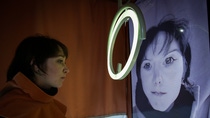The man inside the mirror

Do computers control society? Should we fear Artificial Intelligence? Do you trust computer calculations more than your own intuition? Fearing that the everyday person has a limited understanding of Artificial Intelligence (AI) and its immense opportunities and consequences, Dr. Niels Wouters and his colleague Lucy McRae created the sci-fi installation ‘Biometric Mirror’ to force viewers to question AI, and their own reflection.
When Dr. Niels Wouters looks in his mirror on a Monday morning it tells him he’s aggressive. When he looks again on a Friday afternoon, the mirror tells him he’s less responsible than he was on Monday. These are not Wouters’ own internal interpretations, but rather biometric assessments presented to him in small text on top of his reflection.
Far from an ordinary bathroom mirror, Wouter’s mirror uses a facial recognition algorithm to assess the emotional intelligence, age, gender, weirdness, kindness and introversion of the face peering in. A quick change of settings and it can then transform a person’s ordinary reflection in to a mathematically ‘perfect’ version, based on a formula developed by a Hollywood plastic surgeon.
Skeptical? Disturbed? Curious? If the idea of a mirror that can assess your personality in single glance makes you feel uncomfortable, the Biometric Mirror has done its job.
As an architect, Wouters always had an interest in how people behave in spaces. Whilst studying his PhD, he noticed the way technology was “starting to control” every part human interactions, yet little public debate was taking place in relation to issues of privacy, data security and mass surveillance. Hoping to change that, Wouters teamed up with science fiction artist, filmmaker and inventor, Lucy McRae, to create something “as provocative as possible.”
“We wanted to push the ethics as much as we could,” said Wouters. “AI is very often sold as this magical solution that will fix all the problems in life but it’s not, and the Biometric Mirror is a way for [people] to start to understand that actually, it can be easily abused and it can easily produce wrong results.”
While the technology inside the Biometric Mirror is cutting-edge, it’s ‘calculations’ are fundamentally flawed. Like many AI applications, the mirror’s algorithm is based on crowd sourced data- in this case a set of 10,000 faces ranked on perceived personality traits from the internet- which makes all interpretations opinion, rather than fact, based. The mirror also only uses a single snapshot to conduct its assessments, which can be easily be influenced by lighting conditions, facial expressions and slight changes to appearance.
Despite these obvious flaws, Wouters is astounded by people’s blind faith in the mirror’s interpretations. “People almost blindly believe what the computer told them was true. I think it shows how desensitised people have become to the concept that computers can make mistakes, and it’s very logical as computers are made by humans and we, as humans, make mistakes.”
While such technology may seem futuristic, Wouters thinks it’s mainstream presence is Australia closer than we all think. “We’re not too far away from such a system- we rate our Uber drivers and [they] rate us, we rate our restaurants on Yelp and vice versa. Its’ only a small step for this to apply to everyone and everything,” he said.
Far from being critical of AI, Wouters believes it is “inherently a really interesting and positive innovation”, but strongly advocates governance around its application. Wouters hopes the Biometric Mirror leaves an impression on those who peer inside and encourages them to join in discussions on AI. “I believe the public need to know much more than all the ethicists and academics. AI will introduce significant challenges for society, potentially in the near future, and people simply do not understand it.”
If you dare peer inside, the Biometric Mirror is on display at the Melbourne Science Gallery’s PERFECTION exhibition until 3 November. Proceed with caution, you may not like the results.